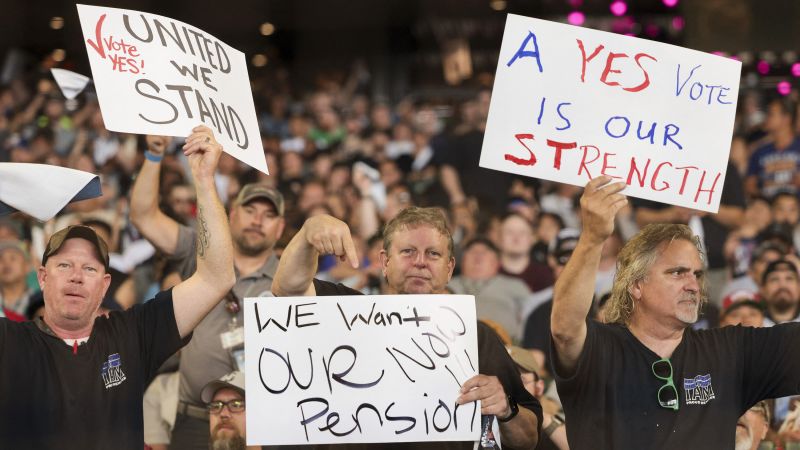New York
CNN
—
Boeing has experienced all manner of bad news in the last six years, and almost nothing but problems. Later this month it could add a strike by 32,000 workers to its list of woes.
The contract between Boeing and the International Association of Machinists is due to expire at 11:59 pm PT on September 12. Without a new contract, the workers who build its planes in Washington state are set to start the first strike at the company in 16 years. And right now, the chances of a deal don’t look good, according to the head of the union local.
“We’re far apart is on all the main issues – wages, health care, retirement, time off,” Jon Holden, president of IAM District 751, told CNN this past week. “We continue to work through that, but it’s been a tough slog to get through.”
It’s just the latest in a series of serious and high profile problems at a company that has dealt with fatal crashes traced to a design flaw in its best-selling jet, accusations that it put profits and production speed ahead of quality and safety, tanking aircraft sales, an agreement to plead guilty to criminal charges that it deceived regulators, and massive financial losses covered by soaring levels of debt.
Both sides say they want to reach a deal without a strike. But the anger of rank-and-file union members over recent contract concessions and difficulties at the once-proud company could make reaching that deal in the short time remaining a tall order.
“We continue to bargain in good faith as we focus on the topics that are important to our employees and their families,” said a statement from Boeing. “We’re confident we can reach a deal that balances the needs of our employees and the business realities we face as a company.”
But Holden said that any deal that can win the support of the rank-and-file needs to recapture some of the concessions the union gave up in two previous agreements since 2008.
Both those talks were contract extensions, rather than negotiations for new deals. And in both cases the union felt forced to agree to concessions, including increased payments by members for health insurance and the loss of traditional pension plans, or risk losing thousands of jobs. Boeing was threatening to build nonunion facilities to handle the production of the 737 Max and the 777X.Boeing, which has one non-union 787 Dreamliner plant in South Carolina, dropped plans for those additional non-union facilities as part of those deals.
Boeing goes into these talks with a brand new CEO, Kelly Ortberg, who started the job on August 8. He issued a statement that he wants to “reset our relationship” with the union after meeting with Holden and other union leadership in his first week on the job. But Holden said he has not seen any differences in Boeing’s stance at the bargaining table.
Ortberg’s predecessor, former CEO Dave Calhoun, also told investors in July that Boeing’s intention is to avoid a strike and seemed to signal it’d be willing to pay what it takes to avoid a work stoppage.
“We know wage asks will be big,” he said. “We’re not afraid to treat our employees well in this process. So, we’re just going to work as hard as we can not to have a strike.”
The company said that wages for IAM members have increased 60% over the last 10 years due to general wage increases, cost-of-living adjustments and incentive pay. But the union is still angry over the earlier concessions. It is also seeking improved time off and also better job guarantees so it won’t be faced once again with the threat of losing work to nonunion plants.
“We cannot go through another period where a year or two from now where our jobs are threatened,” Holden said,
Numerous unions, including the Teamsters at UPS and the United Auto Workers union at GM, Ford and Stellantis, won double-digit wage increases in recent union deals. But in those and many other cases, they were negotiating with companies making record profits and with plenty of resources to satisfy union demands.
By contrast, the problems at Boeing have resulted in $33.3 billion in core operating losses over the course of the last five years, forcing the company to go deeply into debt. It is in danger of having that debt downgraded to junk bond status, but Holden insists that the union still has leverage in these talks.
Despite its problems, Boeing is still a major force in the US economy and shutting it down will have a wide ranging impact. Beyond the 32,000 union members out of the nearly 150,000 US employees, the company estimates its own economic impact at $79 billion, supporting 1.6 million direct and indirect jobs at more than 9,900 suppliers spread across all 50 states.
But perhaps more importantly, Boeing is one of only two major suppliers of commercial jets to the airline industry. And the industry is already dealing with Boeing’s delayed deliveries that can’t be ramped back up until it addresses questions about the safety and quality of its planes.
“They haven’t said they can’t afford our proposals,” he said. “They are reasonable. We’re in a tough position because of decisions they made to keep increasing the dividend and share repurchases, cutting R&D. They’ve been paralyzed to launch a new airplane. It’s because of those decisions and the crashes that we’re in this position.”
One of the union’s bargaining goals is to get a union representative on the Boeing board of directors, which has faced harsh criticism for the company’s many problems.
“The board certainly deserves to be criticized,” Holden said. “We don’t want to run the company. But we want to make sure our voices are being heard about the decisions being made. We love the Boeing Company. It’s the people on the board who don’t. They sacrificed its integrity.”









